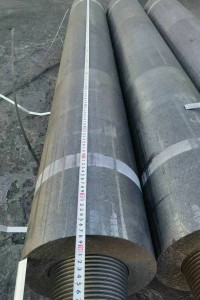Graphite electrode is a type of electrode used in high-temperature electrical applications, particularly in the production of steel through the electric arc furnace (EAF) process. Graphite electrodes are essential components in this method of steelmaking, where they conduct electrical current to melt scrap steel and other raw materials.
Graphite electrodes are usually made from a mixture of petroleum coke, pitch, and other carbonaceous materials. These materials are compressed and baked to form the electrode. The resulting graphite electrode has high electrical conductivity, high temperature resistance, and good mechanical strength, making it ideal for use in the extreme conditions of an electric arc furnace.
The electric arc furnace process is a popular method for producing steel due to its flexibility and ability to use a variety of raw materials. In this process, scrap steel and other raw materials are melted using the heat generated from an electric arc between the graphite electrodes and the steel being melted. The electrical current passes through the graphite electrodes, creating an intense heat that melts the materials, allowing impurities to be removed and alloying elements to be added to produce the desired steel grade.
Graphite electrodes come in various sizes and grades to meet the specific requirements of different steelmaking applications. The diameter and length of the electrodes can vary depending on the capacity and design of the electric arc furnace. Additionally, the quality and composition of the graphite electrode, including its density and thermal conductivity, play a crucial role in the efficiency and performance of the steelmaking process.
One of the key factors in the performance of graphite electrodes is their resistance to oxidation and thermal shock. During the steelmaking process, graphite electrodes are exposed to extreme temperatures and chemical reactions. The ability of the electrodes to withstand these harsh conditions without deteriorating is essential for maintaining stable and reliable operation of the electric arc furnace.
Graphite electrodes also play a significant role in the overall cost and energy efficiency of steel production. By providing efficient electrical conductivity and heat transfer, high-quality graphite electrodes contribute to reducing energy consumption and improving the melting performance of the electric arc furnace. This, in turn, can lead to cost savings and environmental benefits in steelmaking operations.
In addition to their primary use in the steel industry, graphite electrodes have applications in other high-temperature processes, such as the production of ferroalloys, silicon metal, and other specialty alloys. These processes also rely on the electrical and thermal properties of graphite electrodes to achieve the desired results.
Overall, graphite electrodes are essential components in high-temperature electrical applications, particularly in steelmaking through the electric arc furnace process. Their unique combination of electrical conductivity, thermal resistance, and mechanical strength makes them indispensable for melting and refining steel and other materials. As steel production continues to evolve, the demand for high-quality graphite electrodes is expected to remain strong, driving advances in their composition, performance, and sustainability in the steelmaking industry.
Post time: Jan-25-2024







